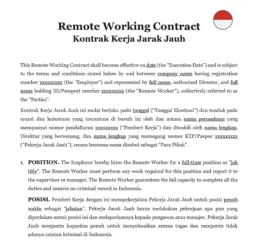Ready to use legal template
Drafted by experienced lawyers
Indonesian-English translation
Ready to use legal template
Drafted by lawyers
Indonesian-English translation
Learn more about Remote Working Contract in Indonesia
In Indonesia, a Remote Working Contract is a legal agreement that outlines the terms, conditions, and rights of both the employer and employee in relation to remote work arrangements. It serves as an essential document that establishes the framework for remote work, ensuring that both parties are aligned on key aspects such as work hours, responsibilities, communication protocols, data security, and performance evaluation. This contract provides a solid foundation for a successful remote work relationship, fostering transparency, accountability, and mutual understanding between the employer and employee. With Themis Partners, you can easily download this template in Word format.
Table of contents
What is a Remote Working Contract in Indonesia?
Why use a Remote Working Contract?
What should a Remote Working Contract include under Indonesian law?
How is it different from an Employment Contract?
What are the termination condition?
What if I don’t have a Remote Working Contract?
How does it comply with legal requirements in Indonesia?
What is a Remote Working Contract in Indonesia?
A Remote Working Contract is a legally binding agreement between an employer and an employee that establishes the terms and conditions governing a remote work arrangement. It outlines the rights, responsibilities, and expectations of both parties involved in the remote work relationship. This contract serves as a comprehensive document that addresses various aspects of remote work, such as work hours, communication protocols, data security, performance evaluation, and the provision of necessary resources. By clearly defining these parameters, it ensures clarity, accountability, and mutual understanding between the employer and the remote employee. It provides a framework for effective remote work collaboration, mitigates potential disputes, and sets the foundation for a successful remote work relationship.
Why use a Remote Working Contract?
Using the Contract is essential for both employers and employees engaging in remote work arrangements.
| ➤ This contract serves as a crucial tool to establish clear expectations, rights, and obligations for both parties. |
| ➤ It ensures that the terms and conditions of remote work, such as work hours, communication methods, data security, and performance evaluation, are clearly defined and agreed upon. |
| ➤ By having a Contract in place, employers can protect their business interests, maintain control over remote work operations, and ensure compliance with legal requirements. |
| ➤ For employees, it provides clarity on their rights, benefits, and obligations, ensuring fair treatment and a clear understanding of the terms of their remote work arrangement. |
| ➤ It also helps to foster trust, transparency, and effective communication between the employer and remote employees. |




